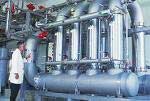Viridis Waste Control, LLC, has announced that the U.S. Patent application for the proprietary bioreactor process was granted by the United States Patent and Trademark office. With the patent, Viridis now has available the Bioreactor Landfill Technology that is the best available technology for America's solid waste disposal landfills.
The patented technology provides significant advances and dramatic enhancements in the reduction of greenhouse gasses, delivers substantially greater air and water pollution reduction, and increased methane production and recovery from landfills. Additionally, the Viridis patented technology enables more useable capacity in landfills for solid waste disposal.
The Viridis Septage Bioreactor Landfill(TM) technology combines the waste pumped from septic systems (known as septage) with garbage in solid waste landfills. Doing so greatly accelerates the process of garbage decomposition and biodegradation, extending the life of typical landfills by years. But, the benefits to the environment go much further, including:
-- Cleaner water, by reducing and hopefully eliminating the practice of
spreading septic waste on fields, which often contaminates surface
water, lakes, rivers, streams, and groundwater recharge zones with
dangerous contaminants and pathogenic biological agents commonly found
in septic tank waste.
-- Safer food supply, by halting the land application and spraying of septic waste for disposal onto farm fields, a major source of bacteriological contamination of crops and livestock.
-- One of the primary pathways by which food or water become contaminated is from the release of such untreated sewage -- septic tank waste -- into a drinking water supply or onto cropland, with the result that people who unknowingly eat or drink such contaminated sources of food and water become infected with disease.
-- In developing countries, most sewage is routinely discharged into the environment, often on cropland. As of 2007, even in developed countries there are periodic system failures resulting in a mode of transmission for infectious agents such as E. coli, hepatitis, cholera, polio, and rotavirus.
-- Cleaner air, with the increased capture and use of methane gas, reducing this major source of greenhouse gas emissions along with its contribution to climate change and global warming trends.

